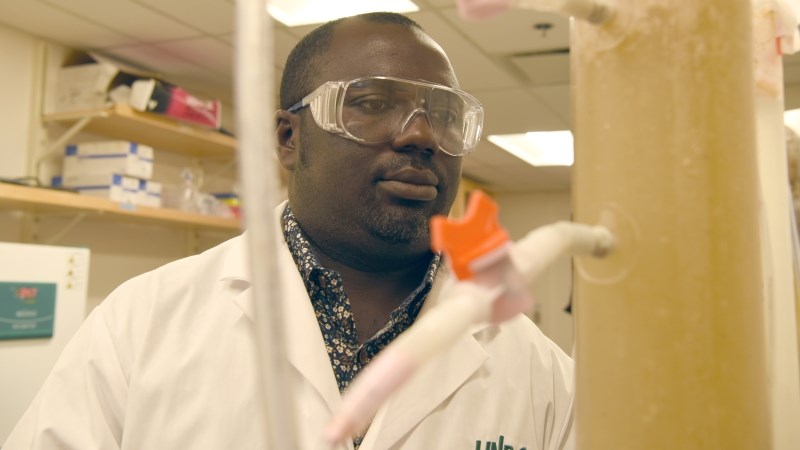A researcher at UNBC is trying to take waste out of ‘wastewater’.
Valuable resources that can be re-used for biomedical, pharmaceutical and geotechnical purposes are flushed down the drain everyday.
UNBC Environmental Engineering Assistant Professor Dr. Oliver Iorhemen is examining methods to extract xanthan, curdlan, tyrosine and phenylalanine from wastewater.
He’s being supported by a Natural Science and Engineering Research Council of Canada Discovery Grant to do this work.
If successful, the resources can be used again in everything from producing waterproof dressings for wounds to creating agents that inhibit HIV infection, to developing absorbent materials to help clean up contaminated sites.
“Part of this research program’s focus is to develop suitable extraction and purification methods for high-value products from biological wastewater treatment systems and organic waste,” Iorhemen says.
“This concept is also in line with the biorefinery concept in wastewater management which seeks to mine resources from wastewater, offering the opportunity of obtaining high-value products from wastewater.”
Iorhemen’s study will build on the research into aerobic granular sludge (AGS), a promising biotechnology made up of a dense consortium of millions of bacteria per gram of biomass held together by bacteria by-products.
Both municipal and industrial wastewater have been effectively treated using AGS biotechnology. Currently, phosphorus, polyhydroxyalkanoates, alginate-like exopolysaccharides, and tryptophan can be extracted from AGS systems, but Iorhemen wants to find ways to take out additional resources.
“The research will involve extensive lab work. I plan to start this research in the environmental engineering lab at UNBC using lab-scale bioreactors,” Iorhemen says. “Once stable operating conditions have been established at lab-scale, pilot-scale testing will be explored for both simultaneous efficient wastewater treatment and high production of these resources in the AGS systems as well as the development of their recovery protocols.”
If successful, the recovery of these resources could be done in a separate facility either attached to a wastewater treatment plant or offsite, or by a new innovative start-up company.
“The outcome of this research will open a new vista of opportunities for economic success as many companies in Canada require these four resources as raw materials, including the food, biomedical, pharmaceutical, petroleum, petrochemical, construction, cosmetic, agricultural, and environmental remediation industries,” Iorhemen says.
The grant worth $147,500 over five years, will support the research of one post-doctoral fellow, two PhD students, two Master of Applied Science students and five undergraduate students.
“UNBC is well placed for this type of research because the institution strongly supports research that is pioneering in its innovation such as this one,” Iorhemen says.
“UNBC also has a highly stimulating research environment for all graduate students, and this will enable graduate students recruited for this research to thrive. In addition, the state-of-the-art equipment available at the Northern Analytical Lab Services within UNBC will allow for high-quality analyses.”



